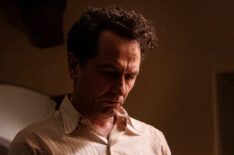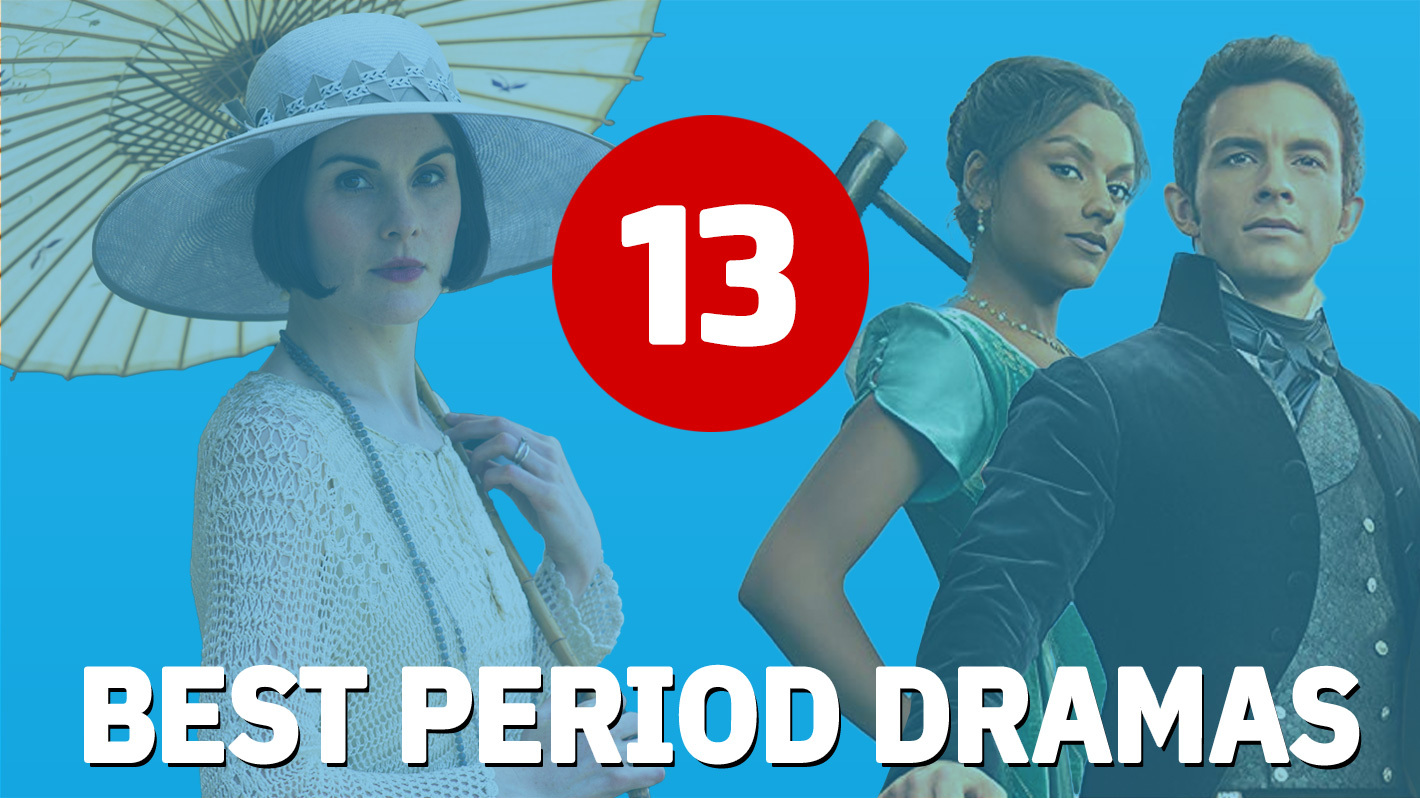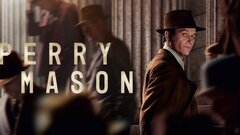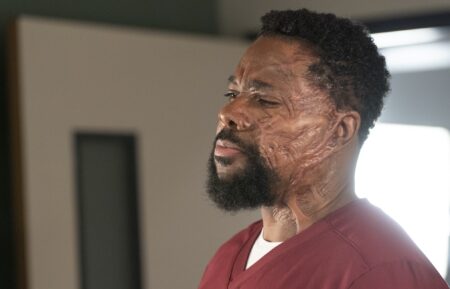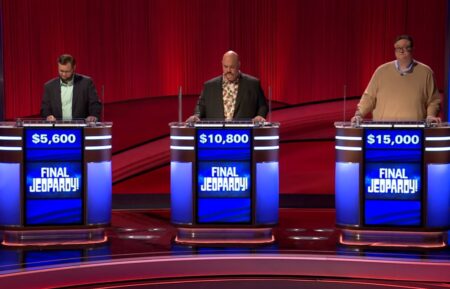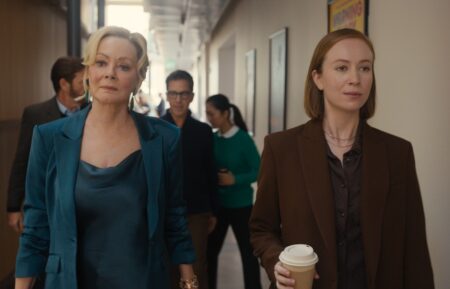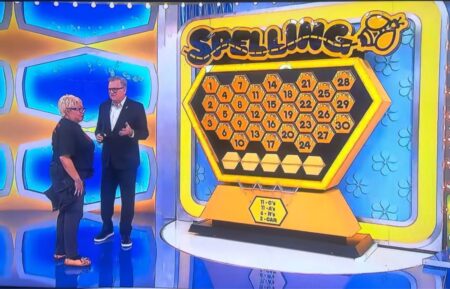‘Perry Mason’ EP Explains Perry’s Sad Ending in Season 2 Finale
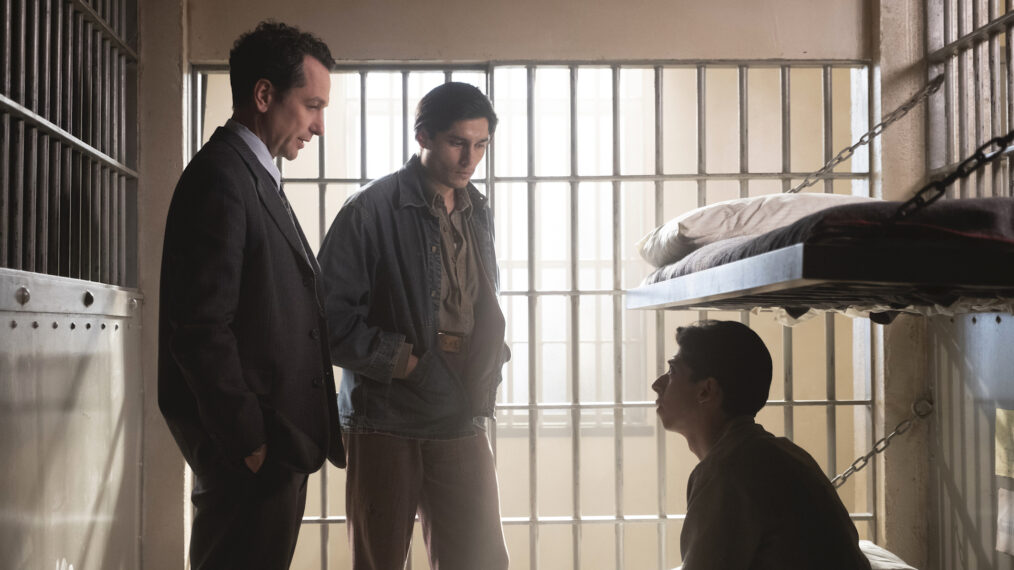
Spoiler Alert
[Warning: The following contains MAJOR spoilers for the Perry Mason Season 2 finale.]
“The illusion of justice” is served in Perry Mason Season 2, and none knew that better than the titular character played by Matthew Rhys.
Haunted by the tragic fate of Emily Dodson (Gayle Rankin), Perry and Della Street (Juliet Rylance) averted their efforts to civil disputes in Season 2. But Perry was drawn back to criminal law when Brooks McCutcheon (Tommy Dewey), son of L.A. tycoon Lydell McCutcheon (Paul Raci), was murdered and Rafael and Matteo Gallardo (Fabrizio Guido and Peter Mendoza) were seemingly framed for the killing.
As the season pressed on, Perry and Della, with the help of Paul Drake (Chris Chalk), eventually discovered that the brothers were, in fact, guilty. But like all cases in the HBO detective noir, the truth was much more complicated than the prosecution wanted the jury to believe. Mateo and Rafael were hired to kill Brooks by Camilla Nygaard (Hope Davis). They accepted the job out of desperation, but also because Brooks forced them out of their homes and caused the death of a loved one.
Getting the best deal possible for the guilty Gallardo brothers also meant facing the music for the hidden murder weapon, which Della concealed in the safe of Perry’s office after Paul discovered its whereabouts. The season ends with Perry beginning a four-month prison sentence, taking the fall for his team.
Here, Perry Mason executive producer Michael Begler breaks down the poignant finale, looks back on the season, and shares his hopes for a Season 3.
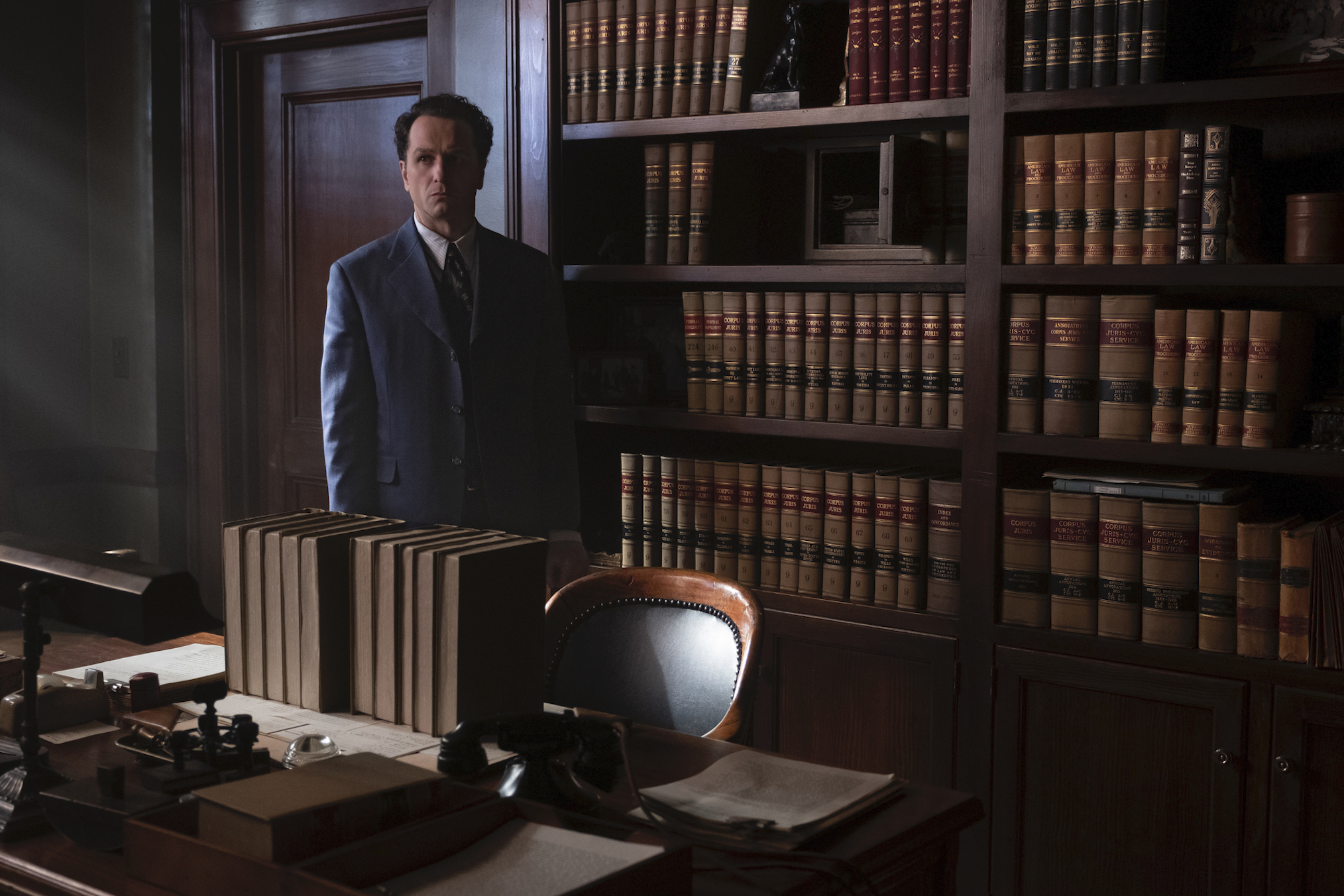
Merrick Morton/HBO
What themes did you want to dig deeper into for Season 2, and what were you hoping to accomplish with the finale?
Michael Begler: Because it was the worst year of the Depression, we really love this idea of the have and the have not and what does justice look like to them? Right away in the first episode, as you know, [Hamilton] Burger [Justin Kirk] says to Perry, “there is no true justice. There’s only the illusion of justice.” And I think exploring what’s behind that, what does that really mean, and where does Perry come out on the other side of that [was a goal].
And what’s related to that theme-wise is Perry’s imposter syndrome coming into the season, not thinking he has the goods to be a lawyer, being haunted by Emily Dodson, even being told by Lydell, I think in the third episode, “even when you win, you lose.” I love the idea of him realizing how much of a fight he has in him in the season, how he can dig deep, and that he reverses that in his mind in the end — that even when you lose, you win. And I think that that’s an important place that I wanted to leave him.
I think that’s perfectly reflected in him taking the prison sentence for hiding the gun in his office. To you, what was the purpose of sending Perry to jail? I wonder if part of him thinks he’s kind of earned it because of what happened to Emily Dodson. I think he’s still kind of racked with that guilt.
Yeah. Again, I think that he feels that there’s so much up against them with the power structure with not only the wealth and the power, but also with the way the system is run in terms of how they look at these defendants and the preconceived notions of defendants, and if he’s going to get any sort of justice. Because he sees the gray, you know? He sees that this isn’t black and white. So much was taken from these kids. Brooks personally took it. They took their family farm, they took their apartment, they killed their sister, all for an empty stadium. And I think that those boys, their backs were against the wall, and they felt like they had no choice. And I think though he doesn’t condone the killing, he understands it and he feels like both these boys can’t go down for this and something’s gotta give.
Maybe it is a little bit of the residual feeling of guilt towards Emily and not seeing it through. Because he did have her life in his hands, and then when he didn’t step up, she kills herself. Well, he’s got these boys’ lives in his hands, and he can’t let that happen again, so maybe the best way is for him to take the sacrifice.
I find that the people who are in support of punishing the brothers are focusing on the violence enacted against Brooks, but they also aren’t looking at the violence enacted against their lives because it doesn’t look like textbook violence, other than their sister being killed. But forcing communities out of their homes is violent, and that’s a relevant theme for today. Why do you think the Great Depression is the right conduit for this theme?
Because this show is 1933 and it’s the worst year of the Depression, it lends itself to those things. And I think that what we see and what you’re touching on is the sort of ripple effect of today that humanity unfortunately doesn’t change. We will see very similar attitudes towards people. And during this time — and a thing that’s just sort of touched on, but we don’t go that far in it — there were forced deportations of the Mexican population. We’re not even talking [about] people who were born in Mexico. We’re talking about people who were born in Los Angeles who don’t speak any Spanish who were put on trains and sent back because they felt they were taking jobs, they were a threat.
All of that just adds to this sort of simmering feeling underneath. What are you supposed to do with that? Are you supposed to just sit on your hands, and or are you supposed to fight? And what is that? And then, what is the right way to fight? Perry is doing it through the law. What are Mateo and Rafael supposed to do? They have nothing, and so how do they wage their fight? Rafael can make as many paintings or drawings as he wants about the injustice, but is that going to get him anywhere? And I think that that’s why part of it is the hard decisions that they had to make.
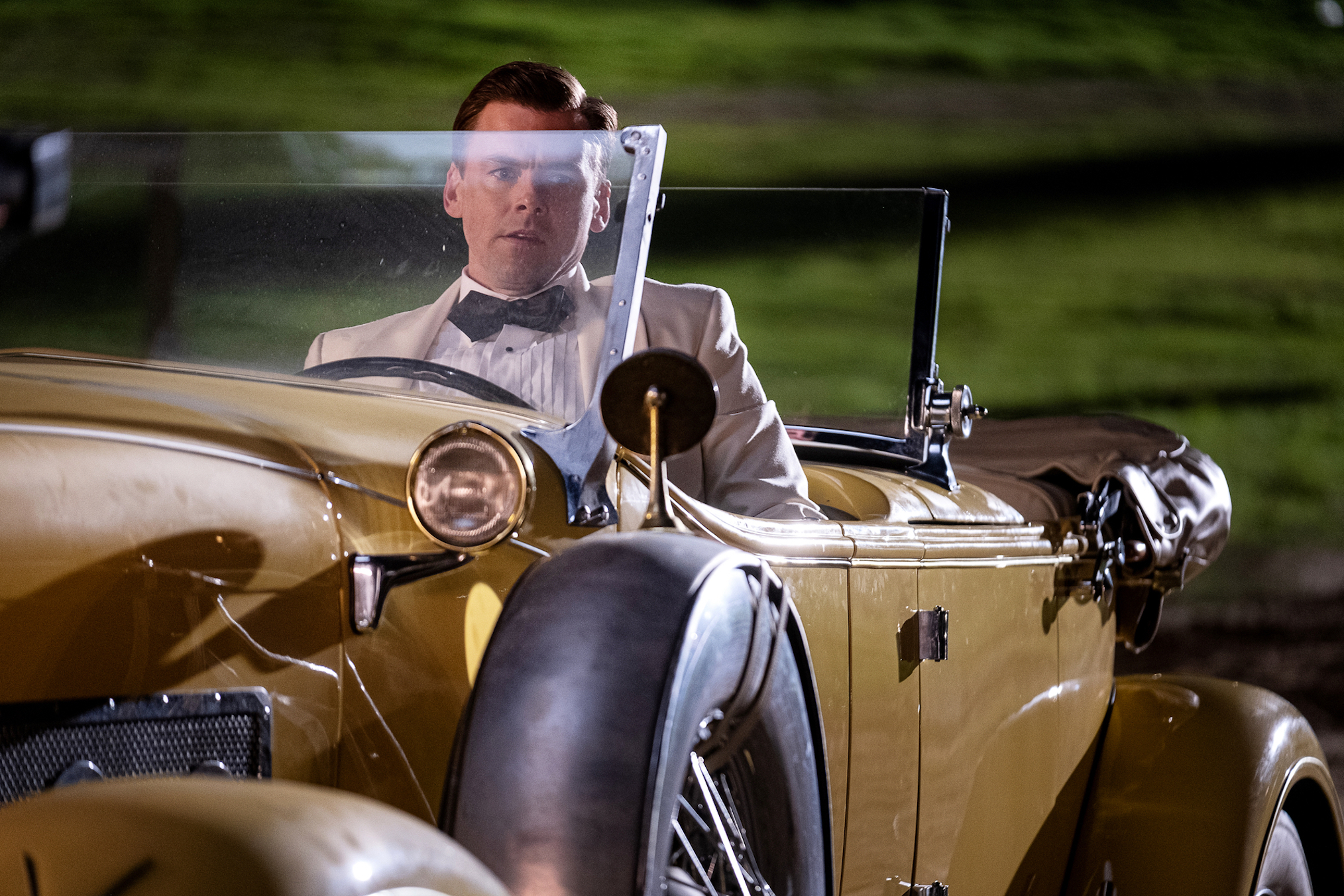
Merrick Morton/HBO
Perry, Della, and the firm are defending people who technically are guilty this time around. How do you think this showcases the hallmark traits of these characters?
We really from early on wanted to play with that, because I think when people think about [the original] Perry Mason … he defends the every man. And probably 99.9 percent of the time, they’re innocent. He gets the other person to admit guilt on the stand. And we said, what happens when that’s not the case? What happens when they are guilty? And especially with the character of Perry, who we are starting from such a low place, he doesn’t know if he has the goods to do this and is questioning whether he even wants to be in L.A., if he wants to run off with Lupe, or if he just wants to leave it all behind. Because of the results of the Emily Dodson case, it just upped the ante for him so much. And I think that that was such an interesting world to play in for him.
For sure. And his whole M.O. is trying to get people to see that what they did was wrong, but the reasons why they did it kind of make sense.
Yeah. It’s all those grays. It’s what he says in his closing argument. It’s the whole idea of like, you all came in here with preconceived notions, let’s not kid ourselves. We all do that. But there’s so much more behind that where [Thomas] Milligan [Mark O’Brien] is trying to be so practical in his closing argument. Perry is trying to open it up and say — and it’s what he says to Della — it’s not about justice, it’s about the system. The system is so broken, and that’s really what the problem is.
I really love the trio of Perry, Della, and Paul. The finale implies they won’t be working together much more once Perry gets out of prison, but I don’t think Paul could stay away. What do you think is the core appeal of this group?
I think at all their cores is the sense of morality. I think they all have that same sense, even though they come from very different places, and they know the right fights to have and the right places to push. And I think that’s what sort of bonds them. And honestly, I think they’re very driven to get at whatever the truth is that they need to get at. That’s what is so great about them as a team, but also what makes them butt heads so much, because they have such strong opinions. If we’re so lucky to get a third season, to see the next iteration of that will be a lot of fun.
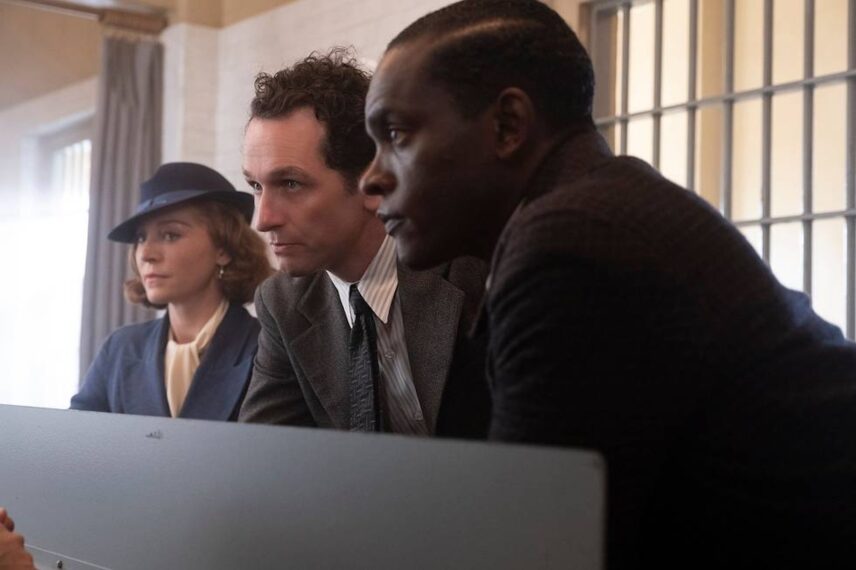
Merrick Morton/HBO
And do you have a vision of where the show will go next, should you get a renewal?
I definitely do. One of the great things is that just by pure luck, I live around the corner from the historian for the show, [William] Deverell. We take walks, we get coffee or get a beer, and he tells me so much about L.A. It just opens your eyes to all those things that you don’t expect and all those corners of the city. Because again, you think about the glamor of 1930s, and most people go to Chinatown. The city was built on so much more than that. And to really go into these places you don’t expect and to play with expectation, not only in terms of the historic, but for the characters, that’s the treasure of doing it.
I thought it was nice to have a new love interest for Perry this season in Katherine Waterston. Could Ginny Aimes be back for more once Perry is out of prison? It seems there’s hope there.
I think it’s gonna be, if we get renewed and as we map it out, where does she fall on that? Where does she fall in terms of Perry’s life, and what can she bring to him to sort of advance him? I don’t have the answer yet, because again, we’d have to really see what that looks like.
And what did you think was the value of her character’s place in this season?
I think it was very important, because when you look at Season 1, as beautiful and amazing as it is, it’s more claustrophobic and Perry always seems to be in the shadows of these giant buildings. I love the scene of him and Ginny taking the horse ride, they reach the cliff side, they’re looking out at the expanse of the city, and she says that line, “Nobody tells you what was, only what can be.” She’s trying to show Perry this other bird’s-eye view to get him out from the shadows and to look at things from a different perspective.
To me, it was key that this is a woman about possibility. And what I really love in that [scene], it’s very subtle, but when there’s a shot of them from the side, in the background you see the Griffith Observatory being built. It’s not finished. If you go back to Episode 4, you can see it. It’s so great because, again, this is about possibility and this is about the expanse and looking out into the heavens. All that stuff, I just really love. That’s what I think that she brings to him, which was important for this case.
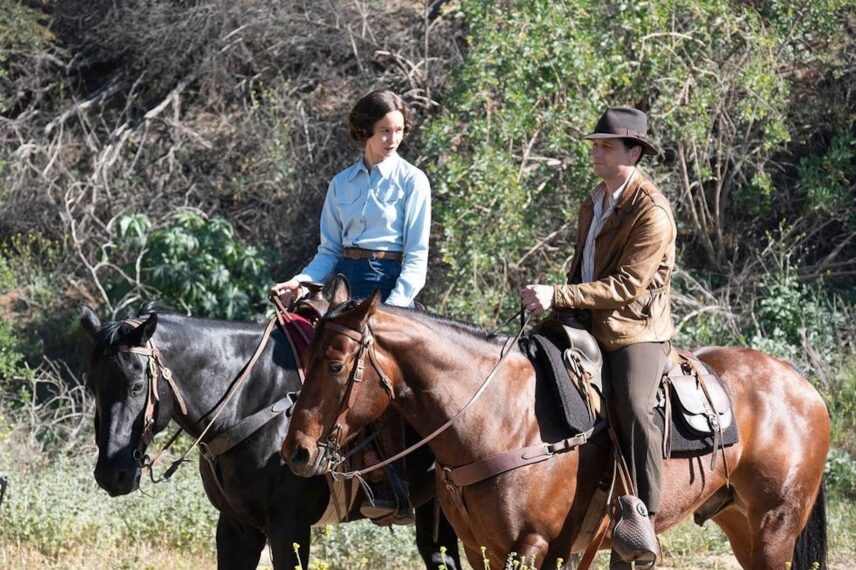
Merrick Morton/HBO
And her being an important role model for Teddy, you can see how she’d be good for both of them.
Absolutely. And it’s one of the reasons that Perry puts that picture up of him and Teddy at the end in the jail cell, because he knows that he has to be the responsible one to teach this kid about morality. He can’t just leave it to others. We used to have a scene in [the finale], that got cut out for a variety of reasons, of the two of them at the end before he goes to jail, and he explains why he’s going to jail.
That was to show how far he had come and sort of what he had sort of taken away from Ginny. What was nice about it, too, was that Teddy says to him that Ms. Aimes read out loud something in the paper about the end of the case in class, and that led [Perry] to feel like he could go back and talk to her at the stables.
Is there anything you’d like to share about this season that I didn’t touch on?
I’m very flattered by the response. I think what we set out to do is coming across. I’m hoping that people walk away both entertained but then there’s that sort of ripple that makes you sort of reflect a little bit. That’s what I think the best television can do.
Perry Mason, Season 2 Finale, Streaming Now, HBO Max


